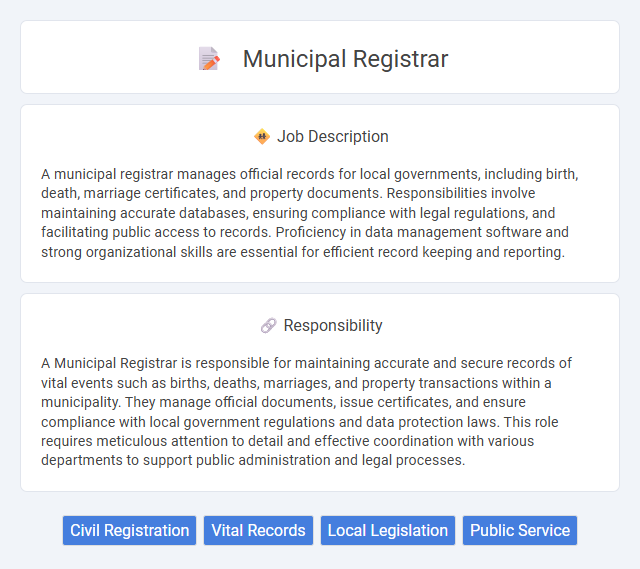
A municipal registrar manages official records for local governments, including birth, death, marriage certificates, and property documents. Responsibilities involve maintaining accurate databases, ensuring compliance with legal regulations, and facilitating public access to records. Proficiency in data management software and strong organizational skills are essential for efficient record keeping and reporting.
Individuals with strong organizational skills and attention to detail are likely suitable for a municipal registrar position, as the job involves managing and maintaining accurate public records. Those comfortable with data entry, record keeping, and interacting with the public may find this role fitting and fulfilling. People who prefer routine tasks and follow established procedures may have a higher probability of success in this position.
Qualification
A Municipal Registrar must possess a high school diploma or equivalent, with many municipalities requiring post-secondary education in public administration or related fields. Strong organizational skills and proficiency in database management systems are critical for maintaining accurate public records. Certification through professional bodies such as the International Institute of Municipal Clerks (IIMC) enhances credibility and career advancement opportunities.
Responsibility
A Municipal Registrar is responsible for maintaining accurate and secure records of vital events such as births, deaths, marriages, and property transactions within a municipality. They manage official documents, issue certificates, and ensure compliance with local government regulations and data protection laws. This role requires meticulous attention to detail and effective coordination with various departments to support public administration and legal processes.
Benefit
A Municipal Registrar job likely offers benefits such as job stability, competitive salary, and comprehensive health and retirement packages. Employees may have opportunities for professional growth and engagement with community records management. This role probably provides a structured work environment with regular hours and public service impact.
Challenge
The municipal registrar job likely presents challenges related to managing large volumes of sensitive public records with accuracy and confidentiality. There may be constant pressure to stay updated with evolving legal standards and regulations affecting recordkeeping. Balancing efficient service delivery with compliance requirements could frequently require strong organizational and problem-solving skills.
Career Advancement
A municipal registrar plays a critical role in maintaining public records, including vital statistics, property deeds, and legal documents, which provides a strong foundation for career advancement into administrative and governmental leadership positions. Mastery of record-keeping systems, compliance with local regulations, and effective communication skills can lead to promotions such as chief registrar, records manager, or municipal clerk. Opportunities for career growth are further enhanced by obtaining certifications in public administration or records management and gaining experience in policy implementation and interdepartmental coordination.
Key Terms
Civil Registration
A municipal registrar specializing in civil registration manages the accurate recording and maintenance of vital records such as births, marriages, and deaths within a specific locality. Proficiency in government regulations, data management systems, and confidentiality protocols ensures seamless registration and issuance of certificates. Effective collaboration with local government units enhances public access to reliable civil documentation and supports demographic data analysis.
Vital Records
A Municipal Registrar manages and maintains vital records including birth, death, marriage, and divorce certificates with accuracy and confidentiality. This role ensures legal compliance, supports public access to certified documents, and assists in reporting statistics critical for government planning. Expertise in database management and knowledge of local and state regulations are essential for efficient vital records administration.
Local Legislation
A Municipal Registrar plays a critical role in managing and maintaining official local government records, including vital statistics, property deeds, and municipal ordinances. Expertise in local legislation ensures accurate interpretation and application of laws governing record-keeping, public access, and compliance with state and municipal codes. Their responsibilities also encompass facilitating transparent document retrieval processes and supporting legal audits within the municipal framework.
Public Service
Municipal registrars play a critical role in public service by maintaining accurate records of vital events such as births, deaths, marriages, and property transactions, ensuring legal compliance and accessibility for residents. They facilitate public trust through efficient management of official documents and timely issuance of certificates, supporting vital statistics and demographic data for community planning. Their expertise in record-keeping and local government regulations helps promote transparency and accountability within municipal operations.
 kuljobs.com
kuljobs.com